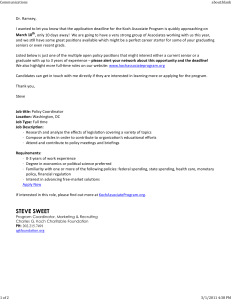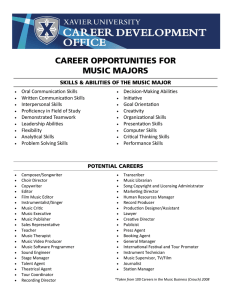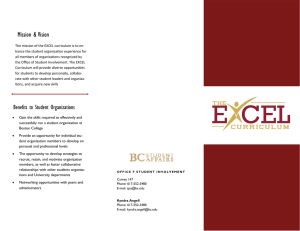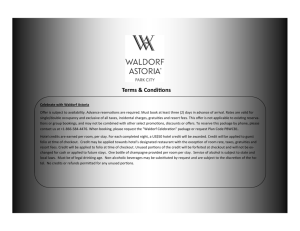Gaining Experience
advertisement
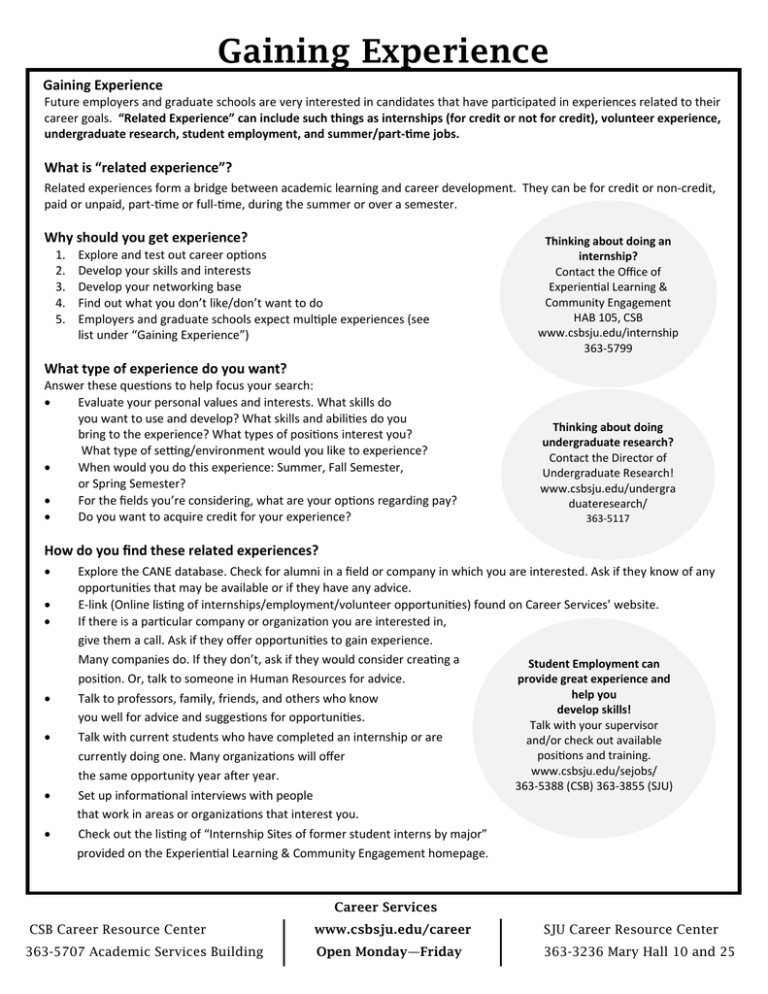
Gaining Experience Gaining Experience Future employers and graduate schools are very interested in candidates that have par cipated in experiences related to their career goals. “Related Experience” can include such things as internships (for credit or not for credit), volunteer experience, undergraduate research, student employment, and summer/part‐ me jobs. What is “related experience”? Related experiences form a bridge between academic learning and career development. They can be for credit or non‐credit, paid or unpaid, part‐ me or full‐ me, during the summer or over a semester. Why should you get experience? 1. 2. 3. 4. 5. Explore and test out career op ons Develop your skills and interests Develop your networking base Find out what you don’t like/don’t want to do Employers and graduate schools expect mul ple experiences (see list under “Gaining Experience”) Thinking about doing an internship? Contact the Office of Experien al Learning & Community Engagement HAB 105, CSB www.csbsju.edu/internship 363‐5799 What type of experience do you want? Answer these ques ons to help focus your search: Evaluate your personal values and interests. What skills do you want to use and develop? What skills and abili es do you bring to the experience? What types of posi ons interest you? What type of se ng/environment would you like to experience? When would you do this experience: Summer, Fall Semester, or Spring Semester? For the fields you’re considering, what are your op ons regarding pay? Do you want to acquire credit for your experience? Thinking about doing undergraduate research? Contact the Director of Undergraduate Research! www.csbsju.edu/undergra duateresearch/ 363‐5117 How do you find these related experiences? Explore the CANE database. Check for alumni in a field or company in which you are interested. Ask if they know of any opportuni es that may be available or if they have any advice. E‐link (Online lis ng of internships/employment/volunteer opportuni es) found on Career Services’ website. If there is a par cular company or organiza on you are interested in, give them a call. Ask if they offer opportuni es to gain experience. Many companies do. If they don’t, ask if they would consider crea ng a Student Employment can posi on. Or, talk to someone in Human Resources for advice. provide great experience and help you Talk to professors, family, friends, and others who know develop skills! you well for advice and sugges ons for opportuni es. Talk with your supervisor Talk with current students who have completed an internship or are and/or check out available posi ons and training. currently doing one. Many organiza ons will offer www.csbsju.edu/sejobs/ the same opportunity year a er year. 363‐5388 (CSB) 363‐3855 (SJU) Set up informa onal interviews with people that work in areas or organiza ons that interest you. Check out the lis ng of “Internship Sites of former student interns by major” provided on the Experien al Learning & Community Engagement homepage. Career Services CSB Career Resource Center 363-5707 Academic Services Building www.csbsju.edu/career SJU Career Resource Center Open Monday—Friday 363-3236 Mary Hall 10 and 25 How serious should I be about this? Finding a related experience should be approached with the same a tude as a job search. Ideally, you should conduct your search up to six months before you plan to begin. Looking to gain related experience? Career Services can assist you! Here’s how… 1. 2. 3. 4. 5. Develop a “game plan” for your search Get feedback on your resume and cover le er Learn about interviewing skills; complete a prac ce interview Learn about crea ng a por olio (if applicable) A end fair prepara on sessions & fairs 6. Gain networking/informa on interviewing skills 7. Receive assistance with E‐link 8. Learn how to research organiza ons 9. U lize CANE (CSB/SJU alum database) 10. We’re fun and helpful! Applying and Preparing for Interviews Apply for more than one opportunity. Prepare and customize your resume and cover le er. Make an appointment with a career counselor for feedback. Follow proper applica on procedures for the specific experience for which you are applying. Research the companies and organiza ons to which you are applying. Prepare for the interview. Schedule a “prac ce” interview with Career Services. Follow‐Up and Make Decisions Write thank you le ers and make follow‐up phone calls. Based on the offers you receive, decide which opportunity best meets your personal and professional goals. Formally accept or decline all offers in wri ng or by telephone. Other strategies: Don’t be afraid to call! Most people will be fla ered to talk with you regarding opportuni es in their field and/or with their company in an informa onal interview. Also, you will make a contact that could lead to a posi on. Organiza ons love students who will work for free. If you are having a hard me finding something in your area of interest but really want the experience, think about taking an unpaid posi on. Consider a part‐ me job that will offer you important transferable and marketable skills. If you can’t secure a posi on that seems related, consider experience that will build your skill set.
